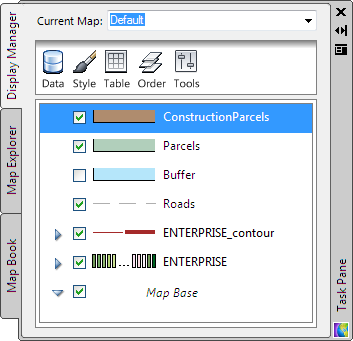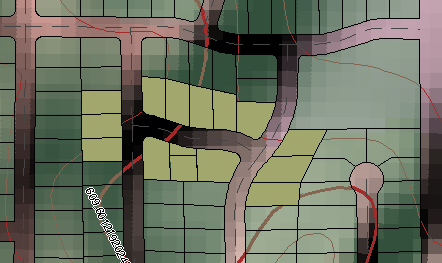AutoCAD Map 3D Tutorials > Tutorial: Analyzing Data Using Styles, Joins, and
Buffers > Lesson 3: Analyzing Data by Proximity Using Buffers >
Exercise 4: Compare the two parcel layers
Remove the filtered parcel layer and connect to both the original and filtered parcels as separate layers.
NoteThis exercise uses the AnalyzeMap1.dwg map you created
and modified in the previous exercises.
To compare the two parcel layers
- In Display Manager, right-click the Parcels layer and click Remove Layer.
- In Display Manager, click Data and click Connect to Data.
- In
the Data Connect dialog box, connect
to the SDF file you just created, which contains only the parcels
that lie within the construction zone. Add this data to your map.
Leave the Data Connect window open, but move it to one side so you can see the Task Pane.
- In Display Manager, select the new Parcels layer, and then click its name. Enter a new name, for example, ConstructionParcels.
- In the Data Connect dialog box, connect to the file that contains the original set of parcels. Add this data to your map and close the Data Connect dialog box.
- In Display Manager, right-click the original parcels layer (Parcels) and click Edit Style.
- In the Style Editor, set this parcel layer to be semi-transparent (50% transparency) and a light green color. Leave the Style Editor open.
- Click the construction-zone parcel layer (ConstructionParcels).
- In the Style Editor, set this parcel layer to be opaque (0% transparency) and a medium brown color. Close the Style Editor.
- In Display Manager, re-display the surface raster image by selecting its box and the box for the contour layer.
- In Display Manager, clear the check box for the buffer layer.
- In Display
Manager, click Groups and
click Draw Order.
The name changes to Order and you can set the draw order of the layers in your map.
- Make
sure the draw order looks like this:

Click Groups and click Draw Order to change the name of the button to Order. Use Order to change how layers overlay each other.

Your map now displays the raster image, overlaid with the roads, the original parcel layer, and the construction-zone parcels.


